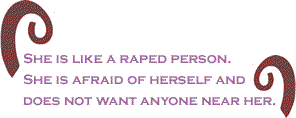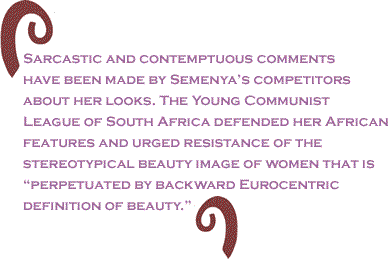
|
||||||||||||||||||||||

|
|
 |
|
| The South African runner made international headlines when she won the 800 meters in a record-breaking 1 minute 55.45 seconds. Caster Semenya’s victory was eclipsed by claims that she was really a male and therefore had an advantage over her female competitors. Accusations of jealousy quickly came from family and friends; charges of racism came from the South African government. Both camps were unified that had Caster lost the race, her sexuality would not have become an issue. Sarcastic and contemptuous comments have been made by Semenya’s competitors about her looks. The Young Communist League of South Africa defended her African features and urged resistance of the stereotypical beauty image of women that is “perpetuated by backward Eurocentric definition of beauty.” Semenya’s record win led to gender tests by International Association of Athletics Federations (IAAF). The medical report allegedly concluded that Semenya is a hermaphrodite meaning that she has both male and female organs. The male organs are producing the large amount of testosterone responsible for Semenya’s deep voice and muscular build. It came as no surprise that the test results were leaked before Caster could be given the news directly. The young athlete who once extolled “I am who I am and I'm proud of myself” has now been reported to be under a suicide watch. She is said to be receiving non-stop trauma counseling at the University of Pretoria. Butana Komphela, chair of South Africa's sports committee, was quoted as saying: "She is like a raped person. She is afraid of herself and does not want anyone near her. If she commits suicide, it will be on all our heads. The best we can do is protect her and look out for her during this trying time." Maybe Semenya’s personal suffering can fuel the deconstruction of sexual binary and racist beauty standards. Both of these phenomena have too long negatively shaped the social, emotional and cultural of humanity’s psyche. The sexuality of Semenya poses challenges for the IAAF in particular and for sports associations in general. It also elevates the discussion about sexuality in societies where one is forced into being a boy or a girl while totally shunning other natural possibilities.
There’s a lot of finger-point going on now. Semenya was told by one of her coaches that she was taking a drug test because he could not bring himself to be honest about the situation. Leonard Chuene, the president of Athletics South Africa (ASA), who vehemently defended Semenya’s femininity, now admits that the ASA conducted similar gender tests a year ago. Harold Adams, the team doctor, had advised the ASA that Caster should withdraw from the competition to avoid embarrassment for her and the country. The advice was squashed. The South African government has sharply criticized Chuene and added that his actions have caused unnecessary violation of Caster’s dignity and privacy. Recently, the IAAF was blasted by Noluthando Mayende-Sibiya, South Africa's minister for women and children, for how it handled the case. She said the IAAF showed "blatant disregard" for Semenya's "human dignity" and has filed a complaint with the United Nations. To their credit, the IAAF’s initial response was to uphold her gold medal since her advantage was not due to doping or deliberating cheating. However, the situation does present an ethical and political challenge for the group. They will have to struggle with this to ensure the best possible outcomes for now and for the future.
The Semenya experience should open up the narrow teachings about sexuality and gender. We still have a lot to learn about the topic but it should be made clear that shoving people into two narrow categories is unrealistic and detrimental to their health. Identities can include lesbian, gay, bi-sexual, intersexual, pansexual, transsexual, as a starting point. It is estimated that one in 45,000 children are born without an identifiable sex and most parents are coerced to make an uninformed decision shortly after birth. We don’t know if Semenya will be forced to make a choice (which would include surgery if she is to be all-female). Someone seems to be pushing her in that direction for the sake of her career. She appeared on the cover of YOU magazine, uncharacteristically in make up and a dress, in a futile attempt to fit the western image of a woman. Sex and sexuality are difficult issues to discuss in heterosexual societies where patriarchal ideas are taught as the norm. These sexual nuances have existed since the beginning of humankind. If it’s too much to figure out the difference between bi-sexual and transgendered or to fight for gender-neutral restrooms, we can start by accepting how a person chooses to self-identify. No one has the right to decide that for you.
BlackCommentator.com Editorial Board member Jamala Rogers is the leader of the Organization for Black Struggle in St. Louis and the Black Radical Congress National Organizer. Click here to contact Ms. Rogers. |
|
 |
|
Any BlackCommentator.com article may be re-printed so long as it is re-printed in its entirety and full credit given to the author and www.BlackCommentator.com. If the re-print is on the Internet we additionally request a link back to the original piece on our Website. Your comments are always welcome. eMail re-print notice
If you send us an eMail message we may publish all or part of it, unless you tell us it is not for publication. You may also request that we withhold your name. Thank you very much for your readership. |
|
| |
|
| September24
, 2009 Issue 343 |
|
| Executive Editor: Bill Fletcher, Jr. |
| Managing Editor: Nancy Littlefield |
| Publisher: Peter Gamble |
| Est. April 5, 2002 |
Printer Friendly Version
in resizeable plain
text format or pdf
format. |
 |

|
| |
| |










































